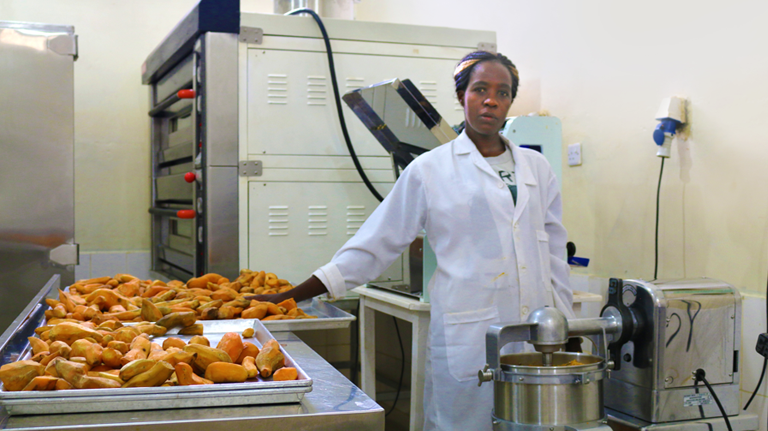
By George Munene
Makueni-based agro-processing company Burton and Bamber Ltd which works with farmers from Makueni and Kitui counties to secure a market for their orange-fleshed sweet potatoes has set up the country’s first commercial microwave processing plant.
Continous-flow microwave heating is an emerging technology in food processing and offers a fast and efficient way to sterilise sweet potato puree while retaining its colour, taste, and nutrition value better than conventional sterilisation systems.
It makes the puree storable for over a year at ambient temperature eliminating the need for cold storage.
According to the International Potato Center (CIP) Orange-fleshed sweetpotato (OFSP) puree can be used as a substitute for 30-60 per cent of the flour in a range of baked or fried products, reducing production costs and increasing their nutritional content.
It can be used to fortify baby foods, and porridge, and incorporated into school meals and bakery products such as bread, buns, and doughnuts.
Related News: Local & export demand for orange fleshed sweet potato grows with superfood classification
Related News: Elgeyo Marakwet farmer who grows orange fleshed sweet potato to exploit its rich market
The orange-fleshed sweet potato which is classed as a superfood is one of the richest natural sources of beta-carotene which is converted to vitamin A in the human body. Just 125 grams provide the daily amount of vitamin A needed for children aged five or younger.
Vitamin A is critical for growth and development in young children and for building vision, immunity, and reproduction capabilities.
Under an out-grower scheme, Burton and Bamber (B&B) signed contracts with farmers to supply sweet potatoes as well as provide them with training on the best agronomic practices when growing the tuber to ensure they produce sufficient quantities and quality.
Trained farmers were issued Global Gap certification-- an international standard for food safety.
The innovative system for sweet potato puree production involves peeling, steaming, and pulping the sweet potatoes.
Related News: Farmer triples his income by growing orange fleshed sweet potato
Sweet potatoes have the advantage of being able to be grown on marginal land with few agronomic inputs; early maturing varieties can be harvested in 3-4 months when most other sources of food are still in the shamba; early maturation also makes them drought and disease tolerant as well as being resilient to effects of climate change.
The project is part of the Development and Delivery of Bio-fortified crops at scale project funded by the UK’s Foreign Commonwealth & Development Office (FCDO). The International Potato Center (CIP) working with North Carolina State University (NCSU) and US company Sinnova Tek LLC and Burton and Bamber Ltd are the implementors of the project in Kenya.
















Comments powered by CComment